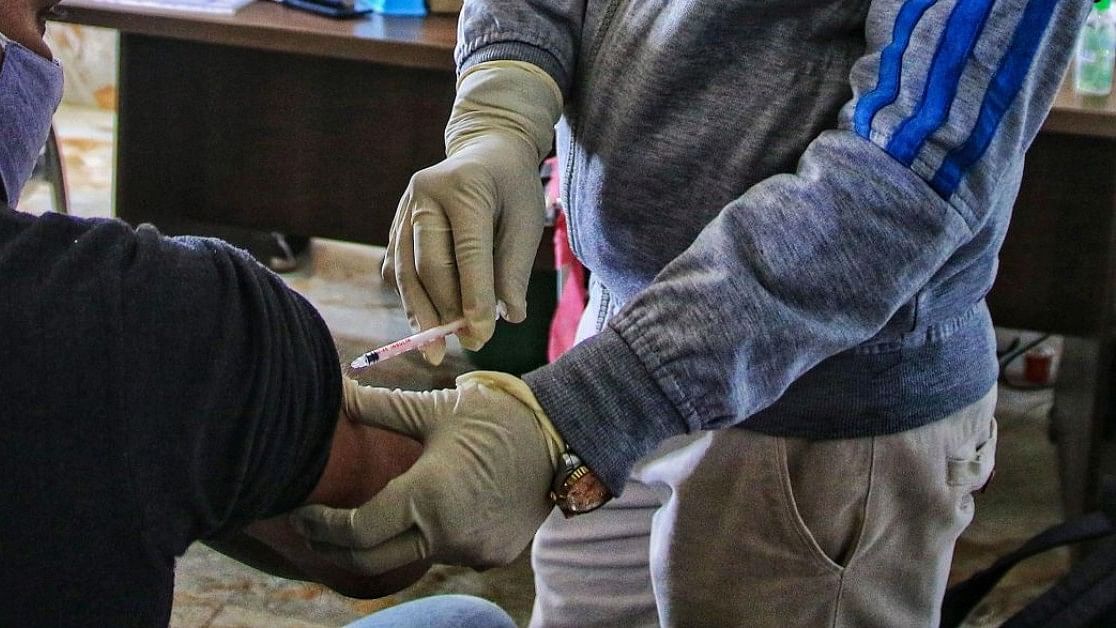
Nearly one-third of the individuals who received Bharat Biotech's anti-Covid vaccine Covaxin reported 'adverse events of special interest,' or AESI, according to a one-year follow up study conducted by a team of researchers at BHU.
Credit: PTI photo.
New Delhi: Close to one-third of over 900 individuals receiving Covaxin shots have developed some kind of adverse effect whereas upper respiratory tract infections have been found among nearly 50% of adolescents receiving the home-made Covid-19 vaccine, Indian scientists have reported.
The study on the long term adverse effects of special interest (AESI) on the indigenous vaccine has identified serious consequences in 1% of the subject population including stroke and Guillain-Barre syndrome, a neurological disorder, prompting the researchers to suggest that more extensive studies are needed to be conducted to understand the extent of adverse effects post-vaccination.
Carried out by researchers at Banaras Hindu University after interviewing 926 vaccinated individuals – 635 adolescents and 291 adults – the study also reported that skin and subcutaneous disorders, general disorders and nervous system disorders were the three most common complaints from the adolescents who had received the Covid-19 shot.
While the majority of the general disorders had recovered, the skin disorders persisted among the majority even after 8.5 months. Close to 5% of adults and adolescents complained of headache persisting among the majority after 9 months, according to the study that has appeared in the journal Drug Safety.
Other adverse effects include musculoskeletal disorders, menstrual abnormalities, eye problems and hypothyroidism.
Covaxin’s manufacturer Bharat Biotech responded to the new research by pointing out multiple design flaws in the study, besides emphasising that previous studies had been executed on the safety of the vaccine demonstrating an excellent safety track record.
“For such a study in safety to be effective, informative and to avoid investigator bias, the AESI safety profile of the subjects prior to participation in the study are required. Also a comparison of safety profiles of non-vaccinated subjects is required during the course of the study along with the comparison of safety profiles of subjects who received other vaccines during the course of the study,” the company said.
The BHU researchers admitted limitations in their study, but pointed out that larger adult based studies were needed to understand the long-term safety of Covaxin.
“With the majority of AESIs persisting for a significant period, extended surveillance of Covid-19-vaccinated individuals is warranted to understand the course and outcomes of late-onset AESIs. Serious AESIs might not be uncommon and necessitate enhanced awareness and larger studies to understand the incidence of immune mediated phenomena post-Covid-19 vaccination,” they reported.
The Hyderabad-based company produced the vaccine in partnership with the Indian Council of Medical Research.
While Serum Institute of India’s Covishield was the most used vaccine in India with 175 crore shots being administered, Covaxin was the second most popular with more than 36 crore shots given in the world’s largest Covid-19 vaccination programmes.
The new study comes at a time when British-Swedish pharmaceutical major AstraZeneca has announced that its vaccine, made in collaboration with Oxford University, was found to increase the risk of a rare but deadly blood clotting disorder known as vaccine-induced immune thrombocytopenia and thrombosis. This is the same vaccine, which was made in India as Covishield by SII.
